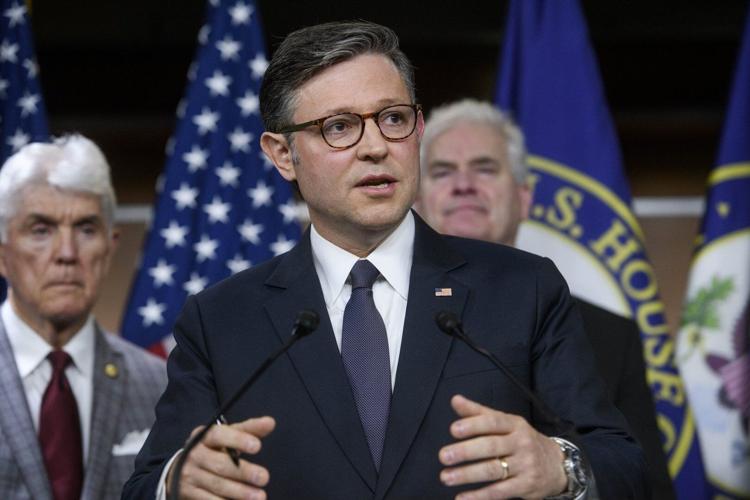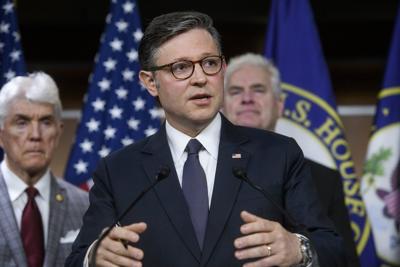WASHINGTON (AP) ŌĆö Tax breaks tallying more than $5 trillion ŌĆö but also sizable reductions in Medicaid health care, food stamps for older Americans and green energy strategies to fight climate change ŌĆö are all up for debate Tuesday as the House Republicans launch marathon public hearings on their ŌĆ£big, beautiful bill.ŌĆØ
It’s a long day and night ahead. Republicans are working to push signature legislative package through a gauntlet of committee hearings over mounting opposition from Democrats, advocacy groups and even some wary Republicans themselves.
Right from the start, one hearing was immediately disrupted by protesters shouting down what the top Democrat on the committee called ŌĆ£cruelŌĆØ cuts to Medicaid and other programs.
ŌĆ£People feel very strong because they know theyŌĆÖre losing their health care,ŌĆØ said Rep. Frank Pallone, D-N.J., on the Energy & Commerce Committee. He asked for the police to refrain from making arrests, noting that some of the people protesting were disabled.
ItŌĆÖs the biggest political and legislative debate for the Republicans leading Congress since TrumpŌĆÖs first term, setting up a career-defining clash over the nationŌĆÖs priorities ŌĆö some $5 trillion in , including the presidentŌĆÖs promises for , offset by $1.9 trillion in tax savings largely from green energy rollbacks, for a net tally of $3.7 trillion in taxes, according to the most recent estimates.
Trump, , struck an ambitious chord, saying Congress was ŌĆ£on the verge of passing the largest tax cut and regulation cut in American history.”
“If we get that, that will be like a rocket ship for our country,ŌĆØ Trump said in Saudi Arabia.
But to be sure, there are many more steps before the package becomes law.
House Democratic Leader accused Republicans of ŌĆ£jamming another GOP tax scamŌĆØ that benefits the wealthy at the expense of programs and services used by Americans.
ŌĆ£It is an egregious and outrageous bill,ŌĆØ Jeffries said.
At its core, the goal for GOP lawmakers is to extend ŌĆö and enhance ŌĆö tax cuts approved in 2017.
Additionally, the Republicans are boosting spending on their GOP priorities, with and funding for the Pentagon.
At the same time, the Republicans are seeking to defray the lost tax revenue and avoid skyrocketing national deficits by with another GOP goal, which is scaling back federal spending with nearly $800 billion cuts to health care, $290 billion to food programs and billions in the Biden-eras green energy investments that millions of Americans rely on in states across the country.
And tucked in is a smattering of other provisions important to the White House ŌĆö including one that would allow the Trump administration to yank the of groups it says support terrorists, sending a chill through who warn it’s a way to punish opponents.
is determined to push the package through the House by Memorial Day, sending it to the Senate, where Republicans are working on their own version and approach.
With the slimmest majority in the House, Johnson has just a few votes to spare, and is running into resistance from his party, including lawmakers in the Senate, which also has thin GOP margins.
ŌĆ£In the current form, I canŌĆÖt support it,ŌĆØ said Wisconsin Republican Sen. Ron Johnson, a deficit hawk who wants deeper spending reductions.
On Tuesday, three House committees will gavel into session for what is expected to be marathon hearings on the three largest components of the package ŌĆö the Ways & Means tax writing committee; the Energy & Commerce Committee that handles health care and energy policy; and later in the evening, the Agriculture Committee that has proposed the food stamps cuts.
Advocacy groups are protesting the cuts and Democrats, as the minority party in Congress unable to stop the bill, are planning to use the procedural tools available in to slow down the process.
The lawmakers are racing for a July 4 deadline to have the whole package sent to TrumpŌĆÖs desk in time to also avoid a dangerous debt default. The Treasury Secretary has said federal tax revenues are running short and Congress needs to raise the spending limit to keep paying the bills.
The package includes a $4 trillion boost to nationŌĆÖs now $36 trillion debt limit, enough to fund operations for several more years.





























